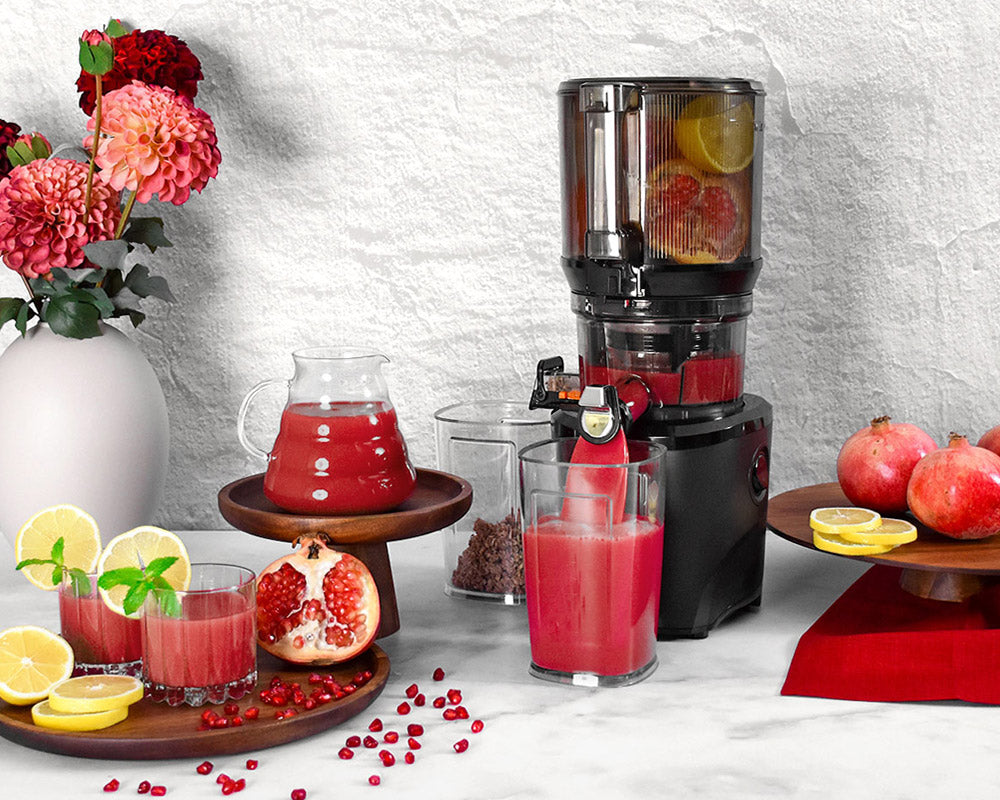FAQ
General Product Questions
What is the difference between the REVO 830 and EVO 820?
Both models feature a flip gate feed chute for inserting whole ingredients. The EV0820 has a 82mm-wide feeding tube feed chute, while the REVO830 has a slightly larger 90mm-wide feeding tube.
In addition, the REVO830 is also equipped with an automatic smart cutting and juicing mechanism, specifically designed for carrots and celery.
The REVO830 also has wider pulp and juice spouts, a larger body, and sleeker juice/pulp cups than the EVO820.
Which whole slow juicer should I choose?
How are Kuvings juicers different from other juicers on the market?
For over 40 years, Kuvings has been creating appliances for healthy living. We were the first juicer company to introduce a wide-mouth feed chute, which allows fruits and vegetables to be juiced without pre-cutting. This patented wide-mouth design reduces prep time for quick and easy juicing. We also manufacture our own products, so we have an in-depth understanding of how our machines are designed and built.
Our juicers are very versatile—you can make juices, smoothies, sorbets & frozen desserts, and instant nut milks!
Are your juicers cold press?
None of our slow juicers generate heat, so they are considered cold press. They don’t have a hydraulic press like traditional cold press juicers, but instead they use a heavy auger to gently crush and press ingredients without generating heat. It’s the most compact and affordable way to make cold-pressed juice at home.
Why are your products called masticating juicers?
“Masticate” means “chew,” and that’s essentially how our slow juicers process ingredients. Masticating juicers crush and press ingredients to extract juice, similar to how we chew our food. This is in contrast to centrifugal juicers, which use a spinning blade to grate ingredients. Centrifugal juicers generate heat and air, which can damage nutritional properties of the juice. Masticating juicers keep the maximum amount of nutrients intact.
Does juicing fruits and vegetables remove their fiber content?
There are two types of fiber: soluble and insoluble. Fruit and vegetable juice contains soluble fiber, which lowers cholesterol, controls blood sugar levels, and more. The pulp contains insoluble fiber, which simply adds bulk to your stool. A balanced diet contains both types of fiber, but juicing is a great way to absorb a large amount of soluble fiber without filling your stomach with insoluble fiber.
Does the juicer come with recipes?
All home-use juicers come with a recipe book.
Are your juicers loud?
Slow juicers are also known as “silent juicers” because the motor turns more slowly, creating less noise than traditional high-speed juicers. Of course, our juicers are not completely silent, but they’re far less noisy than high-speed juicers and blenders.
Product Usage
How to clean your whole slow juicer?
Click on this text to learn how to clean the product.
Juice is leaking from juice cover outlet during juicing.
Juice may leak out if the pulp container is not fitted properly. Please make sure the pulp container is locked into place.
Safety locking arms will not lock.
Check that the parts are perfectly aligned before locking the arms. The parts will only fit in the orientation shown in the manual. Do not force the locking arms shut if parts are misaligned.
The juice pulp still has too much liquid.
When juicing, combine low fiber foods (such as carrots) with high fiber foods (such as kale) to decrease the moisture of the pulp and increase the amount of juice.
Amount of juice is too little.
All produce is different, with freshness often times determining the amount of juicein it. To extract more juice out of refrigerated produce, soak them in clean water. When juicing, combine low fiber foods (such as carrots) with high fiber foods (such as kale) to decrease the moisture of the pulp and increase the amount of juice. Check if the pressure silicone is assembled properly. Also, cut hard ingredients down to size.
Juicer vibrates excessively.
Stop the juicer and reassemble the juicer properly. In particular, make sure the juicing screen is properly seated and no parts are broken.
Ingredients
Can I make nut milk with my juicer?
Yes, you can make most types of nut milk with all our vertical slow juicers. Soak the nuts overnight. Process the nuts in the juicer using 1 part soaked nuts and 1 part water. You can create milk with almonds, soy, cashews, and rolled oats using this method.
Can I make oat milk with my juicer?
Yes, but make sure to use rolled oats. Check out our Rich & Creamy Oat Milk recipe and video for instructions!
Can your juicers process fruits and vegetables with seeds?
Soft seeds—like those found in apples, oranges, melon, and lemons—are safe to juice. Hard seeds and pits—like those found in cherries, peaches, and plums—can damage the juicer and must be removed. If you’re making seed milk, such as pumpkin seed milk, you’ll need to soak the seeds overnight before juicing.
If I juice a whole apple, will I get cyanide poisoning from the seeds?
No. You would need to very finely grind and eat over 200 apple seeds to get cyanide poisoning. Furthermore, the apple seeds are ejected with the pulp.
Can I juice citrus with the peel intact?
Limes and lemons can be juiced with their peel. You can juice oranges with their peel, but orange peels taste bitter. If you juice citrus fruits often, check out our citrus attachment specially designed for citrus juice.
What should I do with the juice pulp?
There are a lot of great ways to reuse juice pulp. You can make veggie burgers, crackers, dog treats, breads, muffins, and more.
Get in touch
Have a question about a product, general inquiry, or partnership inquiry?

